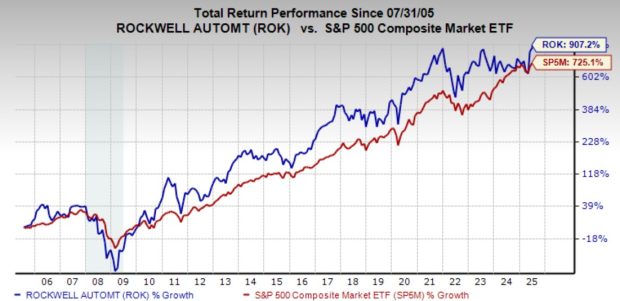On Oct. 7, Nvidia (NASDAQ: NVDA) kicked off its highly anticipated artificial intelligence (AI) Summit in Washington, D.C. This three-day event showcased the practical uses of the technology that has dramatically boosted its stock by 2,700% over the past five years.
Yet, while these developments are notable, the market may be waiting for more tangible results before investing further in Nvidia. Let’s explore this situation more closely.
Nvidia’s AI Summit: Promises and Reality
A Promising AI Landscape
Since the debut of OpenAI’s ChatGPT in late 2022, optimistic forecasts for generative AI have surged. Some analysts at Bloomberg estimate that the generative AI market could reach $1.3 trillion in ten years, a significant jump from $40 billion in 2023. Positioned within this context, Nvidia faces challenges in captivating the market with its ambitions. Nevertheless, the chipmaker is attempting to rekindle excitement.

Image source: Getty Images.
As the AI market largely centers on hardware and infrastructure, Nvidia aims to demonstrate that the software it supports can create genuine value.
During its investor presentation, management revealed several intriguing initiatives, including its NIMs (Nvidia Interface Microservices) plans, which are designed to simplify how developers and companies apply generative AI in specific instances like customer service or drug discovery. The most compelling concept, however, may be Nvidia’s “physical AI,” which involves semi-autonomous robots functioning in real-world settings.
CEO Jensen Huang noted that Foxconn, associated with parent company Hon Hai Precision, is already collaborating with Nvidia to create and enhance AI-capable robots. However, investors should remain cautious and seek more detailed information before diving in, as merely creating an intelligent robot does not ensure it will yield profits or add value for shareholders.
Investors Want Results, Not Just Hopes
Since the start of the AI summit, Nvidia’s shares have risen about 5%, sparking some optimism for its chip business. Nevertheless, these short-term increases are minor in the broader picture. Looking back, Nvidia’s stock still trades below its peak of $136 per share, which it reached on June 18, even with robust operational success.
In the second quarter, revenue soared 122% year-over-year to $30 billion, largely due to increased demand for data center graphics processing units (GPUs) such as the H100 and H200. Yet, with a forward price-to-earnings (P/E) ratio of only 35, Nvidia’s valuation appears relatively modest when compared to its growth potential, indicating that the market is skeptical about its ability to sustain current momentum. For comparison, the average forward estimate for the Nasdaq-100 is 30.
However, unlike many Nasdaq giants that took decades to cultivate their businesses in established sectors, Nvidia’s AI division surged in just a few years. This rapid growth comes with inherent risks. According to Rand Corporation research, approximately 80% of AI projects fail, which is double the failure rate of other start-up industries.
Big Tech’s Commitment to AI
While the future of AI technology remains unpredictable, Nvidia appears poised to sustain its growth for the foreseeable future. Major tech companies are eager to keep pace with advancements in this field, often investing billions in Nvidia’s hardware, even without immediate returns.
Meta Platforms exemplifies this trend. At first glance, the social media giant lacks a clear pathway for monetizing generative AI, given that its primary large language model (LLM), Llama, is freely available to developers. Nonetheless, CEO Mark Zuckerberg expects infrastructure expenses to rise in 2025, as the company focuses on advancing new iterations of Llama to compete with others like ChatGPT and Alphabet‘s Gemini.
The continuity of this AI arms race raises questions about profitability and market viability; therefore, investors may want to exercise caution regarding Nvidia stock until clearer information emerges.
Potentially Lucrative Investment Opportunities Await
If you’ve ever felt like you missed out on successful stocks, here’s a chance to consider.
Occasionally, our expert analysts issue a “Double Down” stock recommendation for companies poised for significant growth. If you’re concerned about missing your opportunity, now may be the best time to invest before it slips away. The following numbers illustrate this:
- Amazon: An investment of $1,000 when we doubled down in 2010 would be worth $21,266!*
- Apple: A $1,000 investment when we doubled down in 2008 would amount to $43,047!*
- Netflix: Investing $1,000 when we doubled down in 2004 would yield $389,794!*
Currently, we’re announcing “Double Down” alerts for three remarkable companies, and you may not have another chance like this for a while.
See 3 “Double Down” stocks »
*Stock Advisor returns as of October 7, 2024
Randi Zuckerberg, a former director of market development and spokeswoman for Facebook and sister to Meta Platforms CEO Mark Zuckerberg, is a member of The Motley Fool’s board of directors. Suzanne Frey, an executive at Alphabet, is a member of The Motley Fool’s board of directors. Will Ebiefung has no position in any of the stocks mentioned. The Motley Fool has positions in and recommends Alphabet, Meta Platforms, and Nvidia. The Motley Fool has a disclosure policy.
The views and opinions expressed herein are the views and opinions of the author and do not necessarily reflect those of Nasdaq, Inc.








